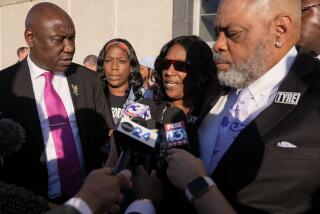King Beating Trial Ready to Start Today : Courts: Mistrial motion is denied, paving way for opening statements. Officers are accused of violating motorist’s civil rights.
- Share via
After seven tense months, the Rodney G. King civil rights trial should begin to unfold today, as federal prosecutors and lawyers for four Los Angeles police officers deliver opening statements about a beating that already has touched off a national debate on police conduct and sparked the costliest riots in U.S. history.
“I’m ready to get this started,” Laurence M. Powell, one of the defendants, said outside court. “We have to get it started to get it over with.”
Powell and his co-defendants--Stacey C. Koon, Timothy E. Wind and Theodore J. Briseno--were indicted by a federal grand jury Aug. 5 on charges that they violated King’s civil rights. If convicted, each of the defendants faces 10 years in prison and fines of up to $250,000.
A pair of last-minute issues that had delayed completion of jury selection were cleared Wednesday, and three alternate jurors were sworn in to join 12 regular jurors already chosen to hear the case.
U.S. District Judge John G. Davies overruled a defense motion for a mistrial, made after Davies refused to excuse a black woman juror whose conduct the lawyers for the officers had questioned in a special, closed-door hearing.
Davies might question the juror about statements attributed to her by a prospective juror who was dismissed. The judge has ordered all members of the jury panel to appear this morning, presumably in case the juror needs to be replaced. But even though defense attorneys asked for the woman to be removed, they said late Wednesday that they expect her to remain on the panel.
“My guess is that this is just a misunderstanding,” said Harland W. Braun, who represents Briseno. “I think she’ll stay.”
Davies also disposed of one other procedural matter that had threatened to disrupt the trial at the last minute. On Tuesday, Wind refused to enter into an agreement regarding a conflict-of-interest issue involving his lawyer, a move that brought the proceedings to a grinding halt. But Wednesday, Davies announced that he refused to accept Wind’s position.
The conflict claim was based on a previous partnership between Wind’s lawyer, Paul DePasquale, and another defense attorney in the case. That relationship could have given DePasquale and the other lawyer, Michael P. Stone, the chance to share confidential information about their clients, but no evidence surfaced that such information actually was exchanged.
Moreover, Davies said that Wind had forfeited his right to raise the issue by failing to bring it up during a January hearing on the conflict question.
With the mistrial motion and Wind’s conflict claim resolved, prosecutors and defense lawyers spent the afternoon picking three people to act as alternate jurors for the trial, which is expected to last six to eight weeks. The alternates will only be used if one of the 12 regular jurors is unable to continue because of an emergency.
The three selected as alternates are a black man, a Latino man and an Anglo man. Defense lawyers and prosecutors exhausted all five of their challenges before those three were picked. Eleven prospective jurors were dismissed for a variety of reasons.
Two of the three who survived the questioning have relatives who at one time worked in law enforcement. The Latino, who appeared to be in his late 30s, said his father worked as a police officer until he retired. And the black man, a student who appeared to be in his early 20s, said his mother used to work in the Sheriff’s Department.
As the lawyers attempted to agree on alternate jurors, they were confronted by an exodus of candidates. Two prospective jurors said they could not be fair because they were strongly supportive of the defendants, one said he could not serve because he is going through a divorce, and another begged to be allowed off the panel, saying: “I’m a nervous wreck. I don’t think I belong up here.”
Despite the dwindling pool of available candidates, defense lawyers dismissed one juror who was eager to serve. That man said he was on welfare and looked forward to serving because it would pay him $40 a day and would give him a chance to test his ability to “maintain objectivity, which is something I’ve gotten better at over the years.”
More to Read
Sign up for Essential California
The most important California stories and recommendations in your inbox every morning.
You may occasionally receive promotional content from the Los Angeles Times.










